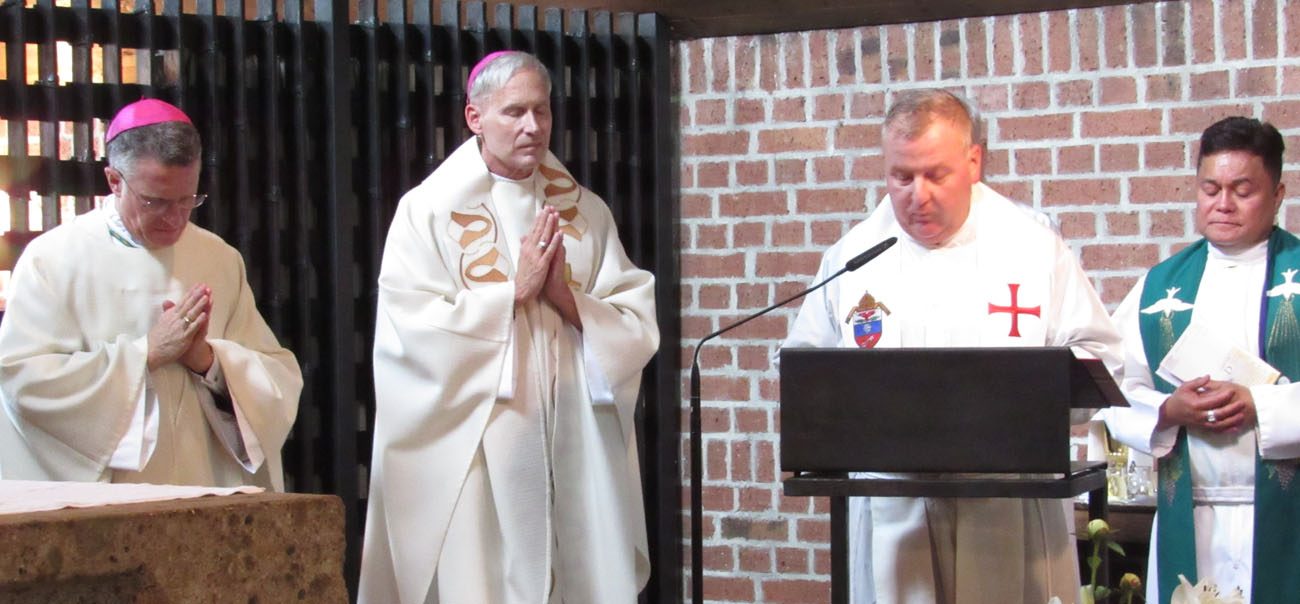DACHAU, Germany (CNS) — A group of nearly 200 pilgrims joined U.S. Archbishop Timothy P. Broglio in prayer, reflection and remembrance for the victims of the Holocaust at the infamous Dachau Concentration Camp in Germany June 4.
Thousands of Jews, Catholic priests and others suffered torture and death before and during World War II at the Nazi camp.
Those involved in the pilgrimage included active-duty U.S. servicemen and women and their families, members of the Military Council of Catholic Women, the Knights of Columbus, and the Archdiocese for the Military Services.
[hotblock]
That morning five buses from Catholic U.S. military communities throughout Germany carried the pilgrims to the camp, where individuals and small groups wandered the grounds, viewing the barracks, the crematoria, and contemplating the suffering that took place there.
An afternoon Mass was said in the chapel of the Carmelite Convent of the Precious Blood, with Archbishop Broglio, head of the U.S. Archdiocese for the Military Services, as the principal celebrant and homilist.
Concelebrating were Auxiliary Bishop F. Richard Spencer of the military archdiocese, who is episcopal vicar for Europe and Asia, and three military chaplains, Father James Betz, a retired Army lieutenant colonel; Father Dino Besinga, a chaplain and an Army major; and Father James B. Collins, also a chaplain and an Army major in the Army.
In his homily, Archbishop Broglio mentioned that the sole purpose for gathering was to “learn to say ‘never again.'”
“In the face of death we are powerless,” he said. “We want to fix what is irreparable. Sometimes, even the search for an appropriate expression of our sympathy is beyond our reach.
“Despite the advances, remedies and accomplishments of the time in which we live,” he continued, “we often find ourselves powerless in the face of certain situations: We see that in so many human tragedies: terrorism, a fatal illness, an accidental death, flooding, tornadoes. It is painful to want to do something, but to be unable.”
Despite being in the midst of seemingly powerless circumstances, Archbishop Broglio said, “the power of God is revealed and with it the mystery of compassion,” and that “we, too, are called to be vehicles of compassion and healing.”
[hotblock2]
“Government and political party are not absolutes,” said Archbishop Broglio. “They must be held to a system of values. If something is legal, it is not (necessarily) good or moral. Men and women died here, because of their religion, ethnic origins, handicaps and their opposition to Nazi regime. Dachau even boasts a ‘priesterblock’ where priests were imprisoned, because they dared to oppose the evil in a regime.”
Archbishop Broglio urged the faithful to remember the humanity in what can be viewed as an inhumane circumstance.
“Coming here obliges us not to assign blame for what happened, but to ask ourselves what we do to ensure that will not happen again,” said Archbishop Broglio. “Our contemporary society easily moves closer to the inhumanity practiced here.”
He gave as an example the May 28 incident involving a 3-year-old child who wandered into a gorilla pit at the zoo in Cincinnati. The gorilla had to be shot to save the boy.
“A hue and cry were heard to lament the death of the gorilla,” the archbishop said. “I am sorry for the animal, but no animal compares to the life of a human person created in the image and likeness of God. If we fail to appreciate that inestimable value from conception to natural death, we can easily repeat what happened here (at Dachau).”
Archbishop Broglio concluded by calling those in attendance to “renew our commitment to what is right, moral and fulfills the dictates not of relativism, but of our conscience.” He urged them not to leave “this sanctuary of inhumanity without a renewal of our fidelity in Jesus Christ.”
PREVIOUS: Pope sets up committee to distribute aid in Ukraine
NEXT: Pope elevates memorial of St. Mary Magdalene to feast day




Share this story